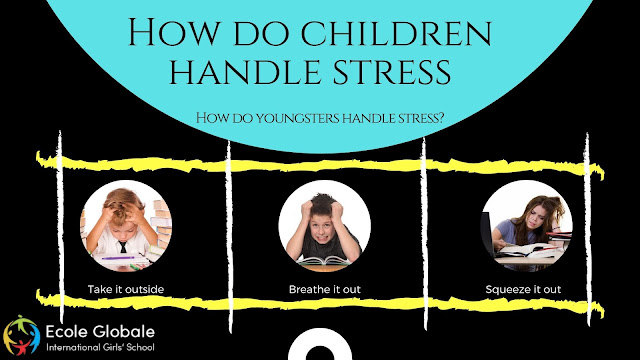 |
| How do children handle stress |
Stress can do a number to our bodies and might decrease our body's
ability to fight off becoming sick by weakening our immune systems. Stress will
creep up on us little by little or can hit us like a wall of bricks. It's
necessary not solely to recognize after we are feeling stressed; however, also
a way to engage in activities that facilitate to reduce that stress.
We are in the era
of cut-throat competition, full of contenders. Students do not want to take
stress, but they are forced by this competition. After considering all these
aspects, a boarding school for girls in India has taken an initiative in which teachers teach their students using
digital tools to make them understand the concept easily. Several apps are
there to assist students in learning concepts using cartoons and caricatures.
And Ecole Globale is one such girls’
boarding school, which is working diligently in the direction of stress-free
education.
How do
youngsters handle stress?
Kids naturally can
seek out experiences that calm their system (if given the house to). Try to recall
after you are playing peek-a-boo with a baby. One minute they're let out and
smiling and therefore the next minute they are looking away? This can be a kind
of self-regulation once they become overstimulated and need a break from the
attention or are starting to feel tired. Fast forward to once they are
toddlers, most little ones can gravitate towards soothing activities such as
digging in the sand, moving objects around, running, or exploring their
surroundings outside or just coloring.
What can I do now?
We can all learn
one thing from each other. As adults, we can look to our little ones for
inspiration, and, in return, we are able to facilitate offer some new tools for
them to carry through life. consider some of these activities below to
undertake along with your family to assist with decompressing:
1. Take it
outside
Being outside will
help to reset and recharge. Explore your backyard, chase around some bubbles,
build a fort, get a game of tag going, or collect nature's treasures by going
on an outdoor scavenger hunt.
2. Let it out
What better way to
soothe one's system than through sensory play? Getting tactile or using your
hands may be a fun and artistic way to reduce stress. Break out the Play-Doh
(or create your own) and roll, flatten and pound your way to a calmer self.
Have access to sand or dirt? Build a sandcastle or create a mud pie. Need more
color? Try finger-painting. Have some yarn and beads? Create some fun new
necklaces together – get your hands working on something.
3. Move it
Not only will
exercise decreases stress and anxiety, but it will facilitate building your
child's strength and improve their sleep. Enough said, right?
Challenge your
youngsters to a dance-off or take a stroll around the neighborhood. Dare your
family members to envision who will do the most jumping jacks for a few
minutes. It doesn't take much.
Do you notice that
after you are feeling a little anxious, your breathing looks to change? After
we feel tense, we start to require quick, shallow breaths. Slower, deeper
breaths, however, prove simpler in reducing stress. Facilitate your youngsters
to learn how to breathe in slowly through the nose, hold it for a few seconds,
and so slowly exhale through their mouths. Observe with them a few times till
they get the hang of it. Deep breaths for kids of all ages will facilitate them
to calm down or focus. Attempt to incorporate the practice the next time your
kid feels angry or frustrated.
5. Squeeze it
out
Squeezing a ball,
hugging a favorite teddy bear, or wrapping your arms around your pillow is a
simple way to release some tension. After we get too overwhelmed or feel
stressed, our bodies react by obtaining tight and tensing up. Redirecting a
child's hands into a physical action such as hugging or squishing something
helps them specialize in something other than what's making them tense up.
Throughout any of
those activities, it's useful to encourage your youngsters to spot what
feelings they're experiencing before, during, and after the activity. This
helps your youngsters identify where they may be feeling nerve-wracking
emotions within their bodies. Use the Mind-Body connector Student Activity
Sheet to assist youngsters better in determining how their bodies may be
indicating how they're feeling.
There are some
interesting Ecole Globale International School reviews by the alumni.
No comments:
Post a Comment